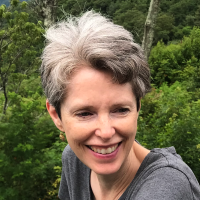View this post on Instagram
Growing up, I read the comics every morning.
One of my favorites was “Peanuts,” especially when Lucy hung out her psychiatry shingle—“The doctor is in.”
Something in me loved that idea. Although I couldn’t really articulate why at the time, I felt drawn toward sharing a space with someone where we could deeply connect.
After many years of unsatisfying corporate jobs, often in workplaces where effective, positive communication and deep connection were virtually unknown, I made a shift to a new, more connected way of working, first as a massage therapist and then as a yoga teacher. Both modalities brought me into that shared, sacred space that I found to be so fulfilling. I loved being able to be present for someone else, offering them my undivided and compassionate attention.
Eventually, that love evolved into becoming certified as a facilitator of Scott Kiloby’s Living Inquiries in 2013. However, over time, I found myself using the facilitation techniques that I had learned less and less, and instead, more simply listening to people and asking simple questions to help them to go deeper.
I discovered that just being truly and compassionately heard allowed my clients to release old emotional patterns and to find clarity, peace, and healing.
Fully present, compassionate listening does not have to be confined to a “professional” therapeutic space.
I believe we can each learn to cultivate such attention in all areas of our lives—with our family, friends, neighbors, and coworkers, even though we may not always agree with each other.
So how do we really listen?
How do we create a safe and sacred space for one another to deeply share and be deeply heard?

We can be fully present with the speaker. We learn how to be fully present with others by cultivating the ability to be fully present with ourselves—with our own unheard yearnings and unfelt emotions. As we increase our capacity to show up for ourselves, we increase our ability to do this for others.
We can develop and enhance our focused presence through meditation, journaling, or anything that allows us to connect with the silent, still place within us.
We can learn to hold our own beliefs more lightly. There are almost eight billion of us on this planet, each with our own personal collection of beliefs. While some beliefs are more beneficial to peace, health, and happiness than others, not everyone who holds different opinions from ours is wrong. Our culture, our upbringing, and our life experiences all contribute to our unique way of viewing the world.
Truly listening means being open to hearing why another feels or acts as they do. This awareness can open us up to more understanding and compassion for those whose ideas and lives are different from our own.
We can let go of trying to fix a problem or needing to share our own story. Unless we are specifically asked, we don’t need to offer advice or share our “me, too” experience. There have been times when I have felt myself shutting down when what I was needing to express was hijacked by the other person as they jumped off into a story about how they experienced the same thing or began to tell me what they thought I should do.
There is a place for sharing and offering advice, but I find this is often more openly received after someone has had the opportunity to be fully heard, and even then can often be unnecessary.
Here, I have also found meditation to be helpful. As I have realized that I don’t always have to follow (or even believe) my thoughts, I have also learned that I can just let mental commentary and “helpful” suggestions be present without expressing them to the speaker.
We can ask questions that allow the speaker to go deeper. We can create the opportunity for people to find their own answers by asking open-ended questions such as:
“How does it feel that…?”
“Is there a way to…?”
“What would you like to do about…?”
“Can you say more about that?”
We can keep communication open and flowing by avoiding asking questions just to satisfy our curiosity or that are really advice in the form of a question such as “Why don’t you…?” Often, silence is better than any question, or we can offer simple words or phrases that show we are listening, such as “Yeah…,” “uh huh…,” or “I totally get that…,” or simply making eye contact or nodding our head.
We can avoid gossiping. If we want to be someone who people feel comfortable confiding in, we must practice keeping silent. If we reveal confidential information that someone else has shared with us, the person we are telling it to might not ever feel comfortable enough to open up to us in fear that we may, in turn, inappropriately share what they have told us.
I have found that there is a deep relaxation and relief in me when I don’t feel like I am supposed to find the solution to someone’s problem.
Instead, I can be completely present with them because I am not lost in my own mind wondering what I should say next, what wisdom I can offer, or what personal experience I can share.
Through nonjudgmental and compassionate listening, we can connect with each other on a deeper level than our superficial beliefs, creating a more loving and peaceful world. It begins with each of us.
~











Read 16 comments and reply